Annual Report on the State of Compliance with the Law of Ukraine "On Ensuring the Functioning of the Ukrainian Language as the State Language" in 2022
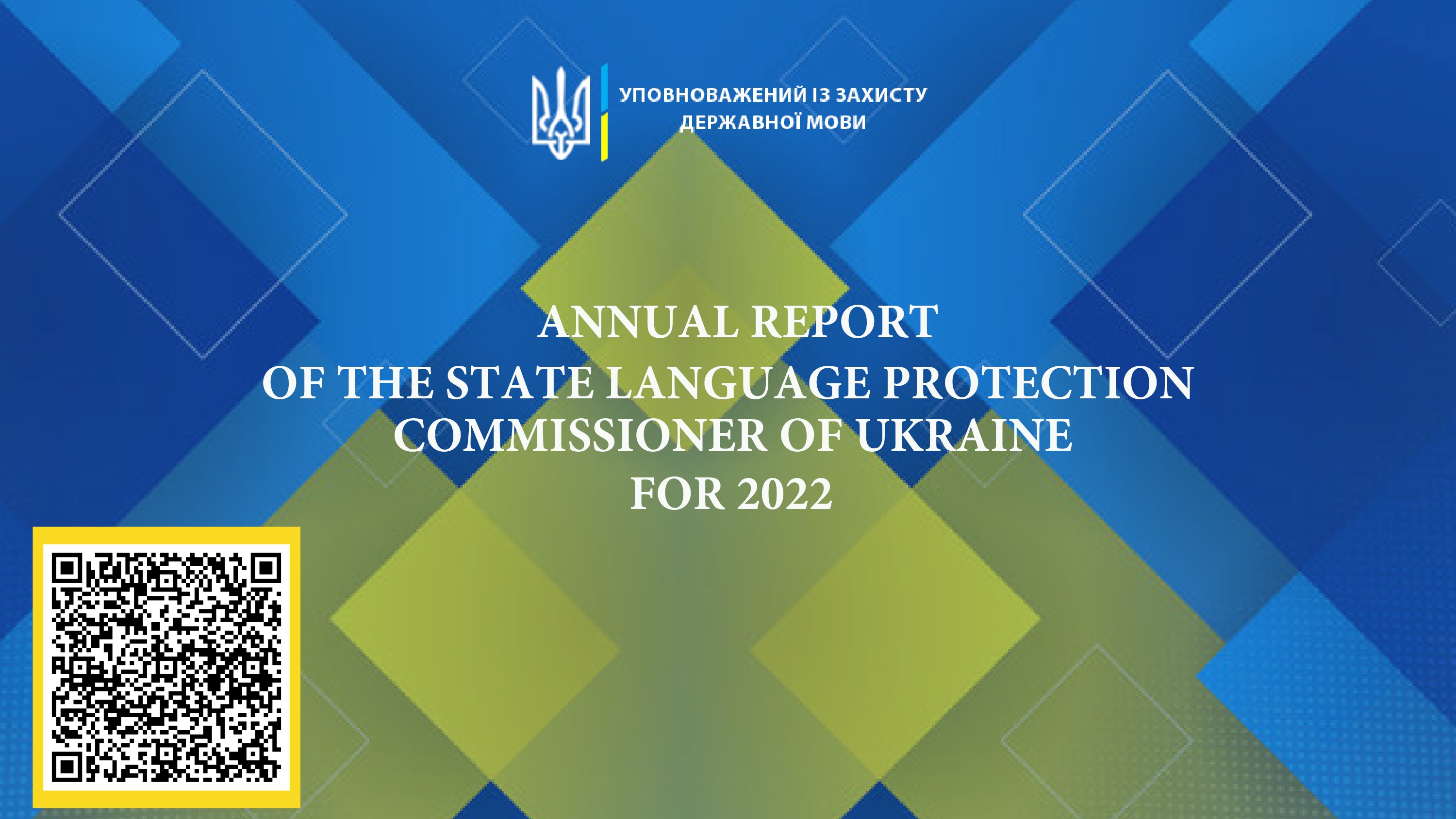
"Annual Report on the State of Compliance with the Law of Ukraine "On Ensuring the Functioning of the Ukrainian Language as the State Language" in 2022" is the third one in our history. Under the conditions of martial law, we did not stop our activities for a moment ensuring the fulfillment of tasks determined by the Language Law. Defending Ukrainian, defending the rights of citizens of Ukraine for information and services in the state language, implementing new articles, and applying new norms of the Code of Ukraine on Administrative Offences (sanctions in the form of warnings and fines), we have taken an active course to strengthen the regional language policy, international cooperation, to update the current legislation under the conditions of martial law.
The Report presents:
- a detailed review of legislative changes and the state of implementation of certain norms of the Law of Ukraine "On Ensuring the Functioning of the Ukrainian Language as the State Language",
- analysis of the functioning of the state language and compliance with the language law in proper spheres of public life,
- A separate section is devoted to the linguocide of the Ukrainian language in the temporarily occupied territories in the conditions of russia’s full-scale invasion.
The heavy, tragic, and at the same time heroic year 2022 was marked by the rapid growth of the level of public support for the state language, a dramatic increase in its use not only in public spheres but also in private communication. The Ukrainian people have made sure that the state language is a powerful, nationally assertive factor of the unity of citizens, an important factor in strengthening the Ukrainian nation, capable to successfully resist the aggressor, overcoming unprecedented challenges, and winning on the battlefields. Ukrainians firmly learned that language is a weapon that strengthens Ukraine and helps to destroy the enemy.
Positive tectonic changes in the use of the state language and the attitude of citizens to it were fixed by all sociological surveys of 2022, they are visible in everyday life for everyone. russian as the language of the aggressor is rapidly losing its position and gives way to the state language in all spheres of public life: in the media, the Internet, cultural industries, education, and the daily practice of Ukrainian business; it gradually disappears from the public space of Ukrainian populated areas, etc.
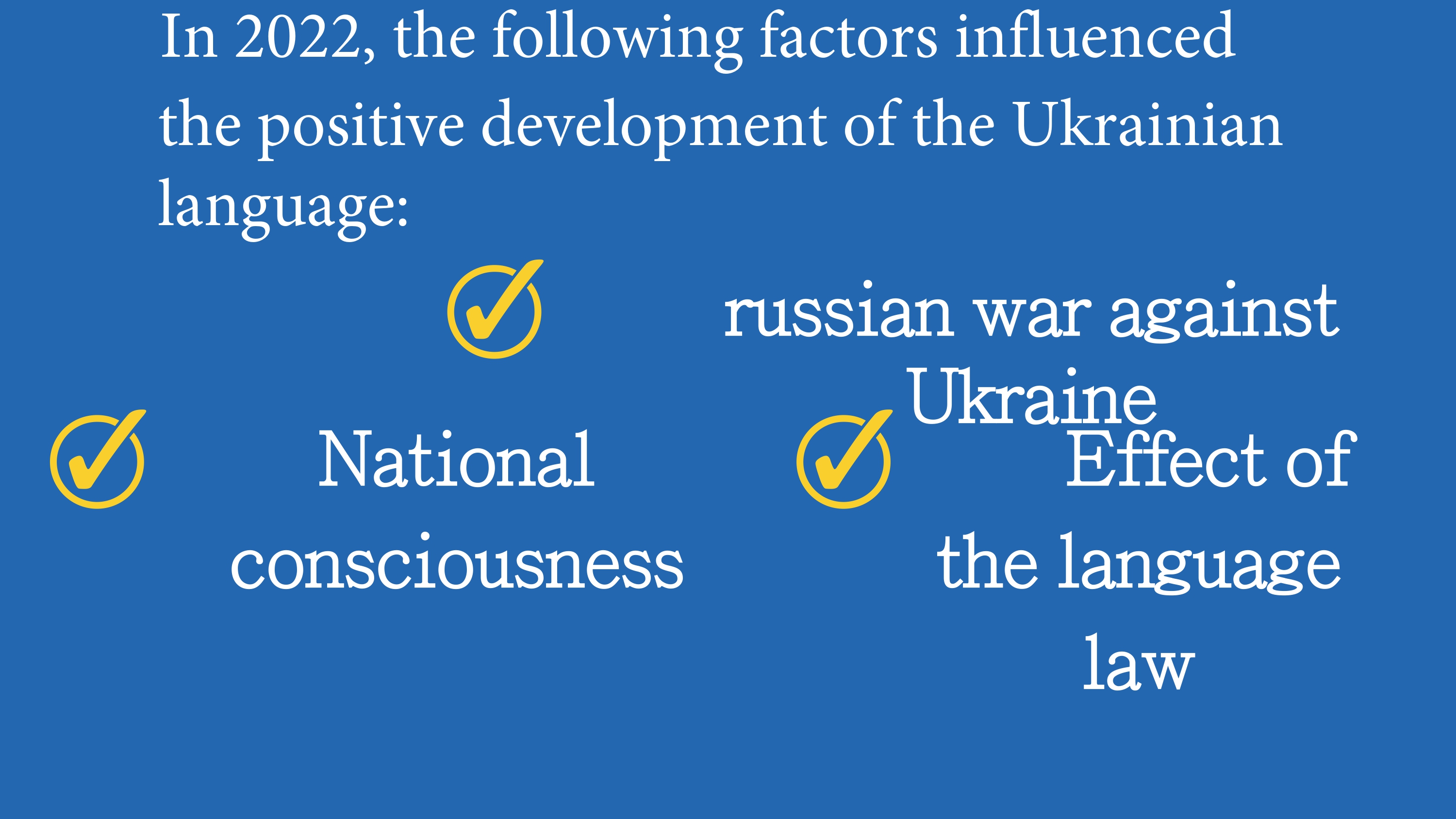
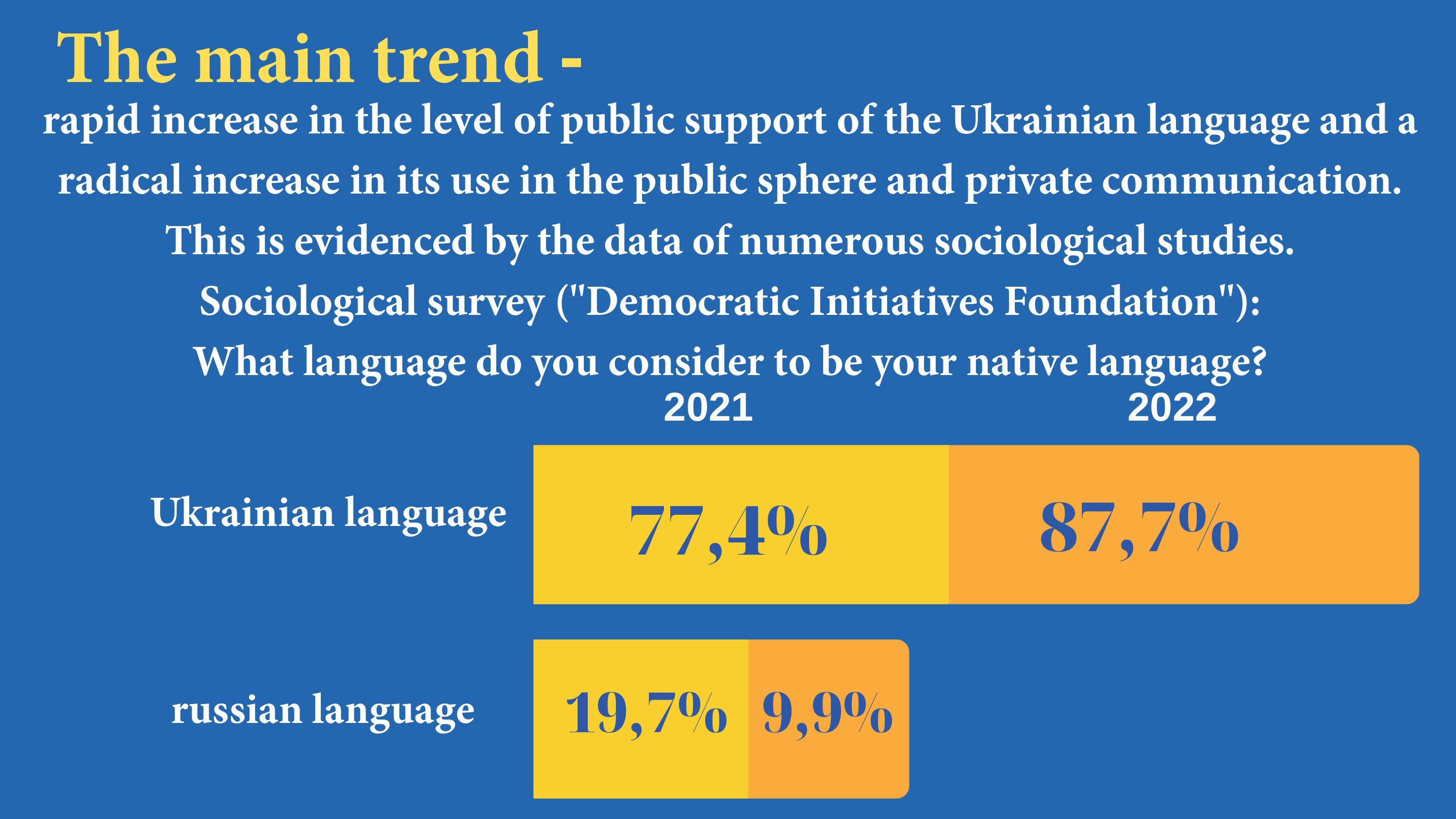
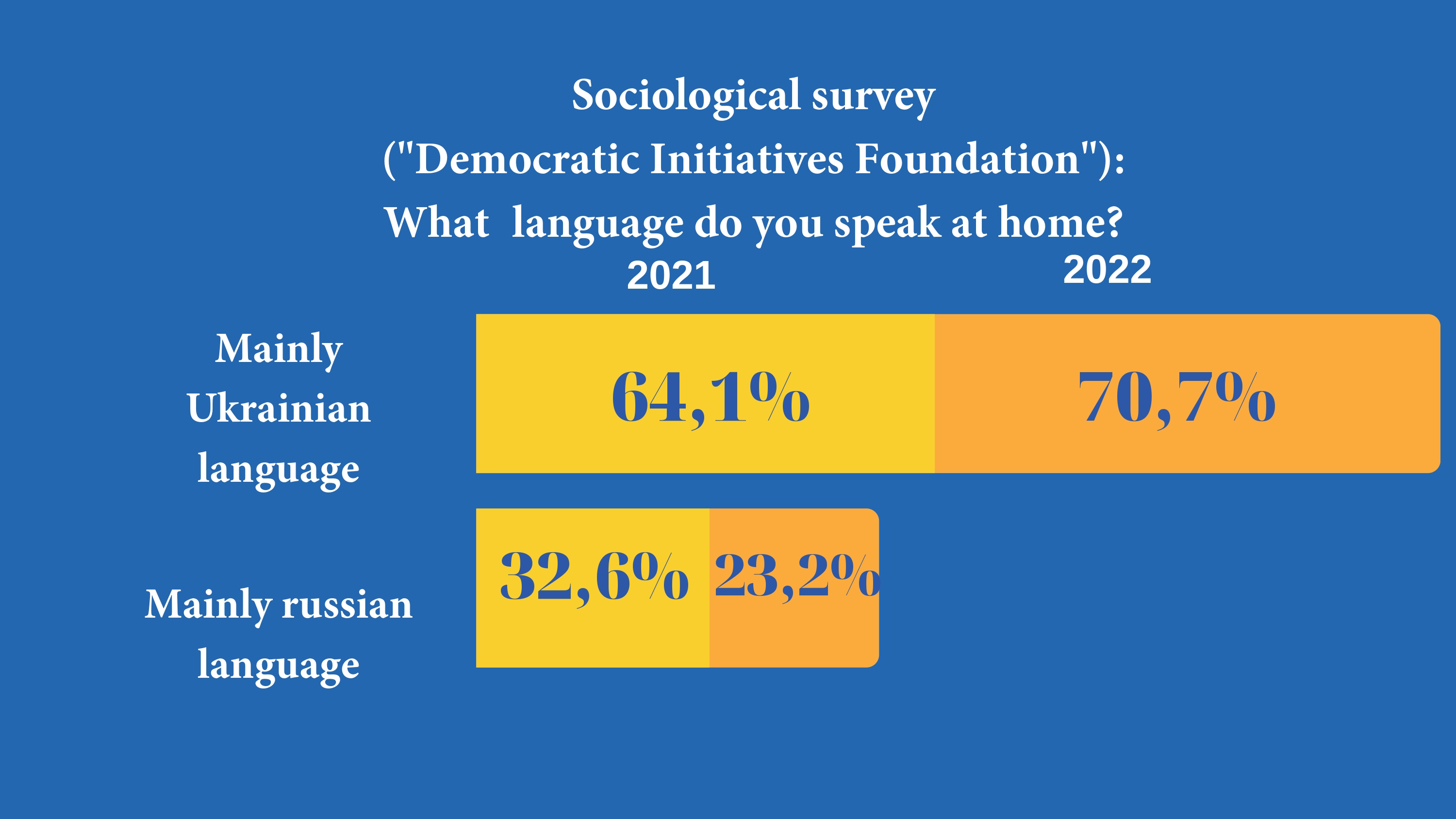
In 2022, the Commissioner received 2 846 appeals from all regions of Ukraine regarding violation of the Law of Ukraine "On Ensuring the Functioning of the Ukrainian Language as the State Language", which is 20% less than in the previous year. This may be related to a decrease in the citizens’ activity in connection with the beginning of the full-scale war in Ukraine.
In 2022, the Language Ombudsman carried out the work within 170 measures of state control over the use of the state language. 130 of these state control measures were completed, 17 state controls were stopped, as they concerned the territories in which hostilities took place in 2022 or which were temporarily occupied.
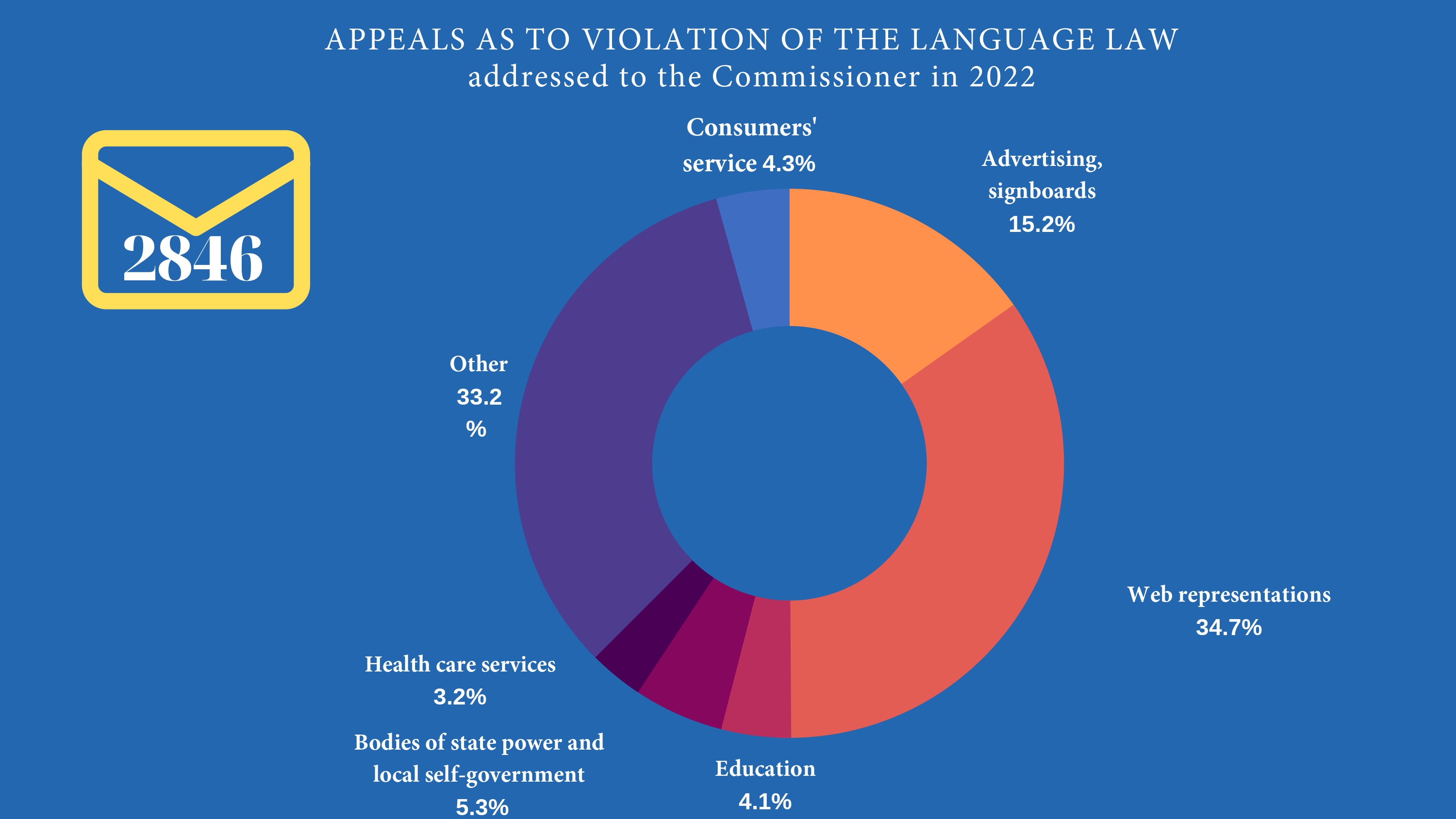
In 2022, within the framework of the all-Ukrainian campaign initiated by the State Language Protection Commissioner to create opportunities for everyone to learn Ukrainian and to disseminate information about free courses, speaking clubs, online educational platforms and other resources helping to master the state language, the Secretariat of the Commissioner carried out the work on systematization, generalization and updating the information on language projects, the current information about which is constantly provided on the page https://mova-ombudsman.gov.ua/kursy. According to the information available in the Secretariat as of April 2023, about 500 free online resources, courses and conversational clubs for mastering the Ukrainian language are available in Ukraine.
In 2022, work on the initiative launched by the Commissioner in 2021 was continued. The initiative involves the development of regional programs for the promotion and development of the Ukrainian language as the state language in the context of the implementation of the first stage of the Strategy of popularizing the Ukrainian Language for the period up to 2030 "A Strong Language - A Successful State". Due to joint work during 2022, a number of relevant documents, aimed at strengthening the regional language policy, were approved.
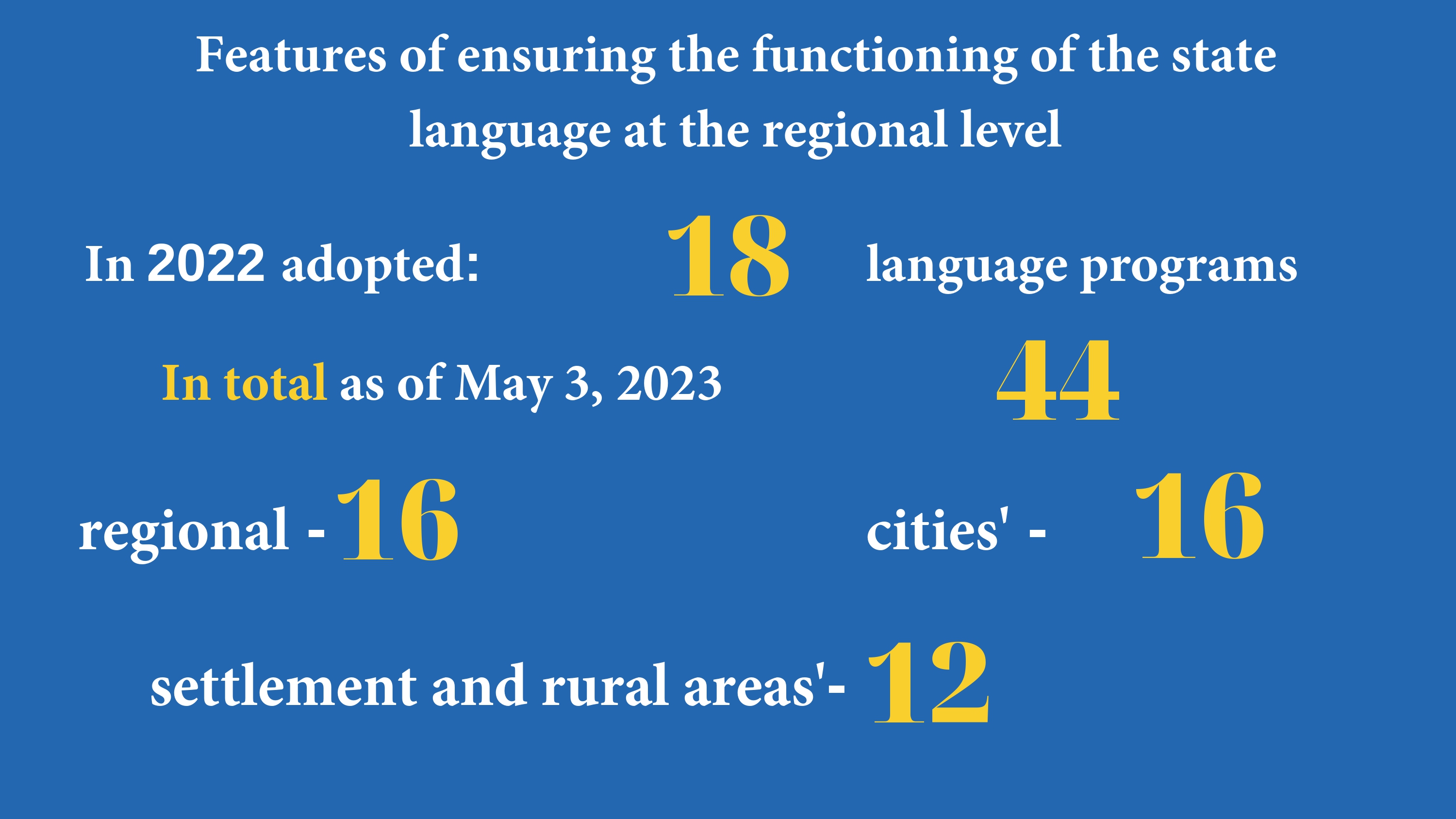
To ensure the effective implementation of the state policy aimed at protecting the state language, its comprehensive development and functioning in the spheres of public life defined by the language law throughout the territory of Ukraine, as well as to prevent violations of the rights of Ukrainian citizens to receive information and services in the state language, the Commissioner outlines the following recommendations:
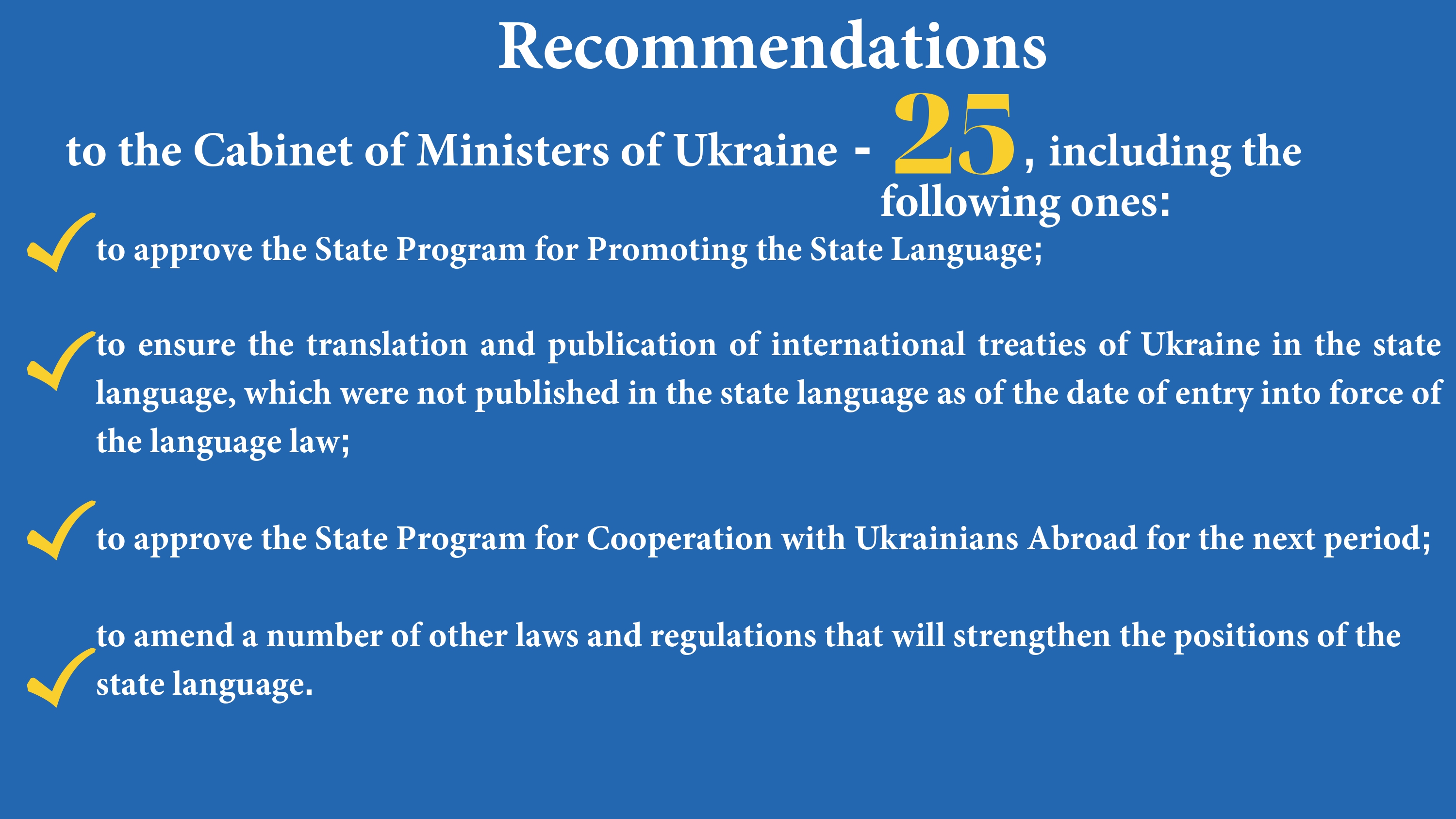
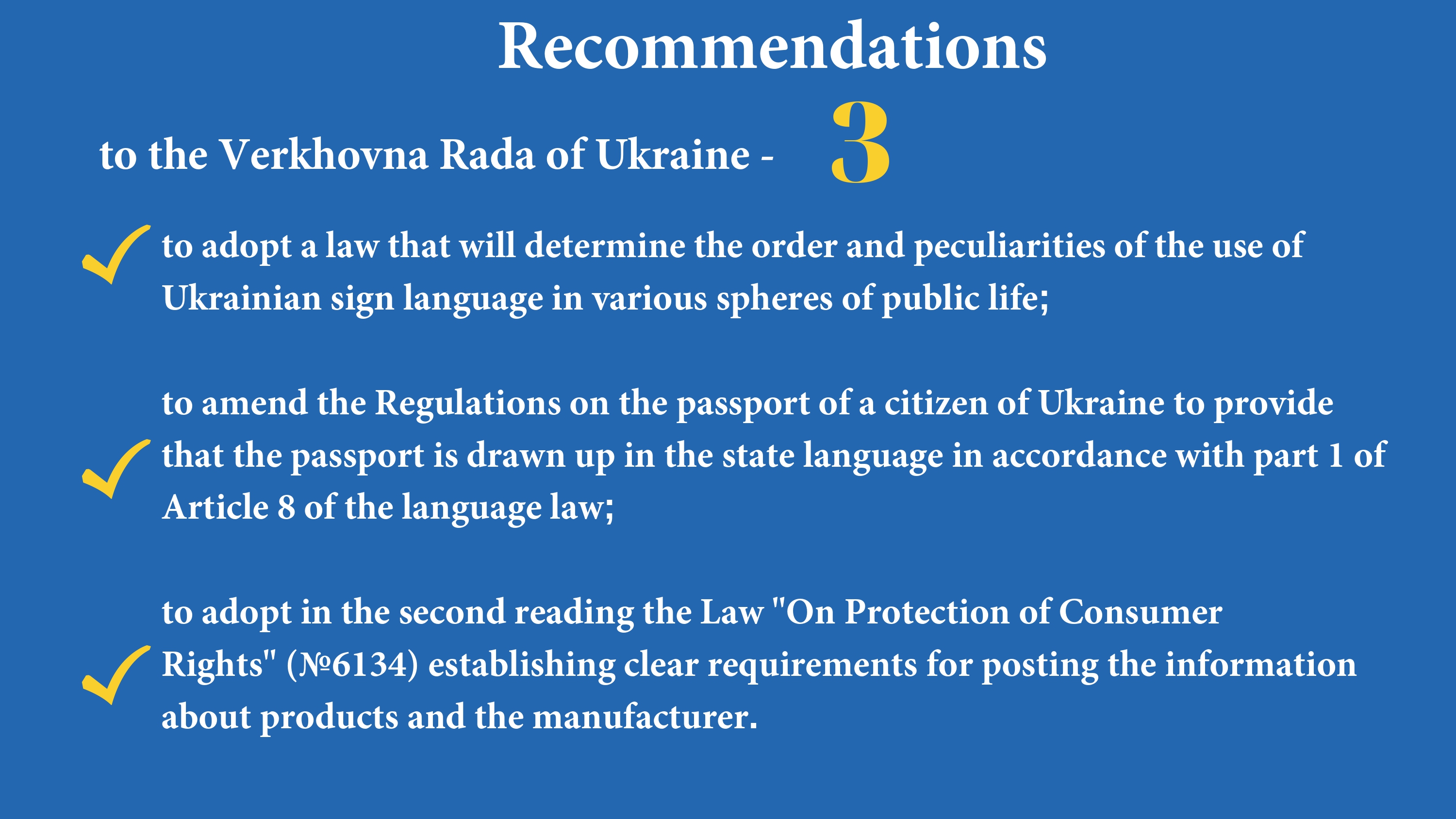
In total, the actions that the aggressor country is taking on the territory of Ukraine are aimed both at the physical extermination of Ukrainian citizens and at non-lethal forms of influence for Ukrainians, in particular at linguocide - the destruction of language in all its manifestations. The Ukrainian language, as always, is the target of the occupying forces, the strategic task of which is the destruction of Ukrainian identity and Ukraine as a whole. Their steps towards the realization of this goal were myths and fakes denying the existence of Ukraine as an independent state, and Ukrainians - as a separate nation with its own language and traditions that have been formed over thousands of years. As well as the direct destruction of the language itself through the prohibition of use and limitation of functioning in various spheres of public life, the burning of books and persecution based on language.
In view of this, the State Language Protection Commissioner initiated the collection and documentation of the facts of the aggressor country's actions in the temporarily occupied territories aimed at the destruction of the Ukrainian language and its speakers. The purpose of such monitoring is to identify general trends taking on the example of certain facts of linguocide as a component of the policy of genocide of the Ukrainian people which is carried out by the russian federation.
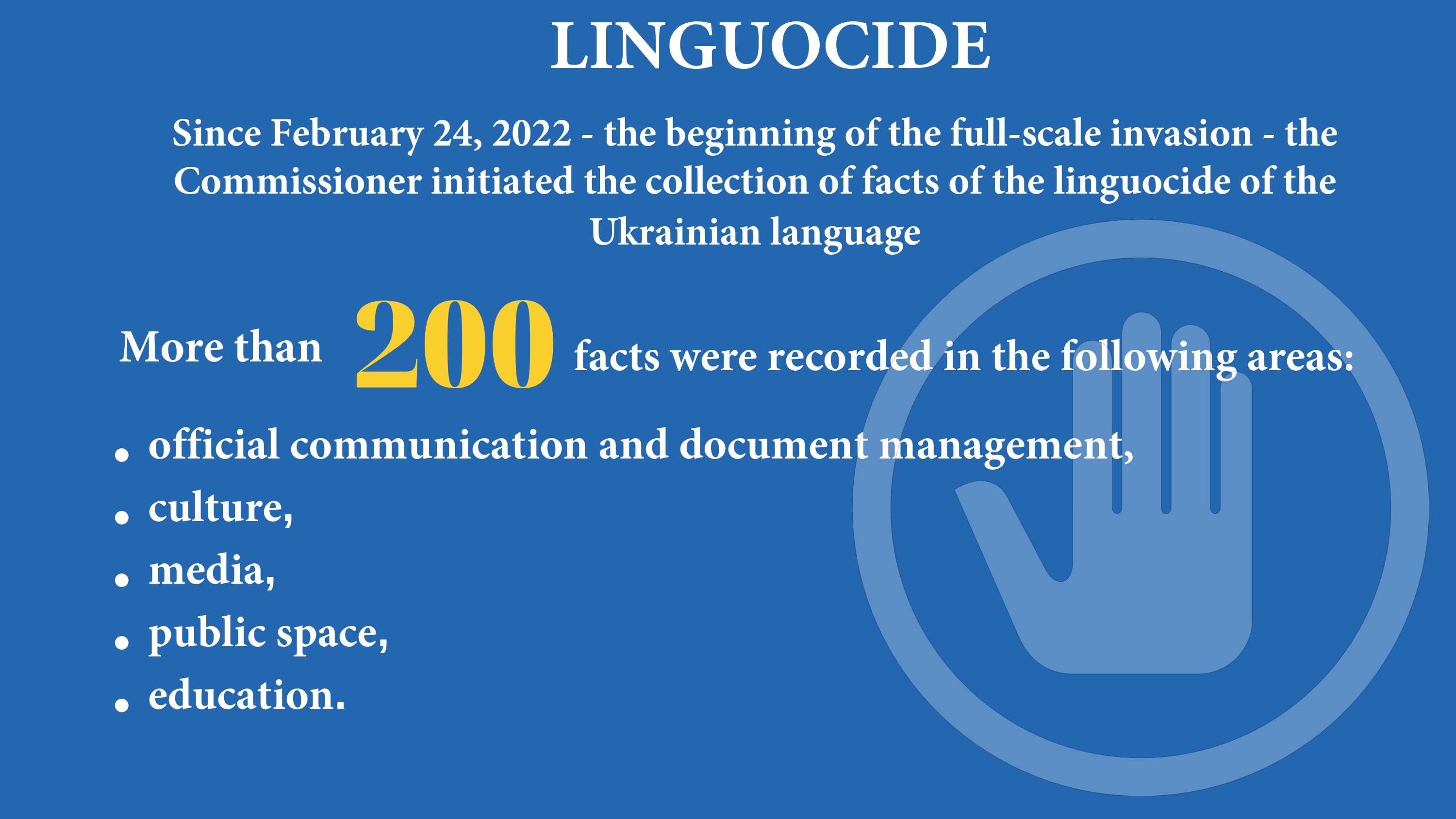
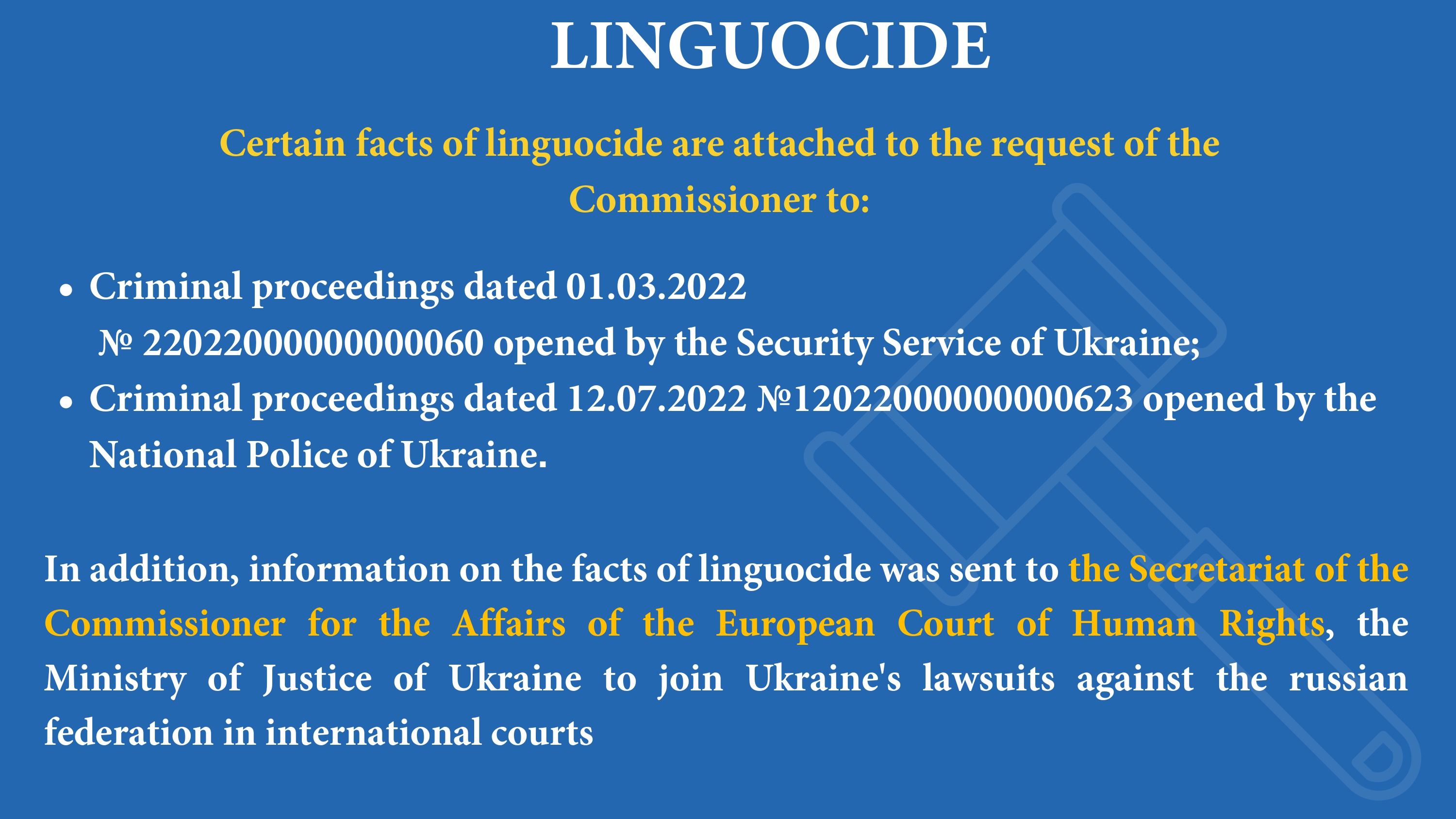
As a result of active work and the established close cooperation of the Language Ombudsman and his Secretariat with the EFNIL management and its individual member organizations, on March 21, 2022 at the extraordinary meeting of the General Assembly of the European Federation of National Institutions for Language (EFNIL), a decision was unanimously made to grant Ukraine the status of an associate member of EFNIL - an organization that provides an exchange of experience and information on language policy, encourages the study of official European languages, promotes linguistic and cultural diversity in the European Union.
Joining the European Federation of National Institutions for Language is a confident step towards the standards of the European community, new opportunities for sharing experience and the best European language practices, as well as the protection and popularization of Ukrainian as the future language of the European Union.
More details on the Annual Report in Ukrainian can be found at the following link, as well as from the video presentation of the Report by the Commissioner translated into English at the link.
